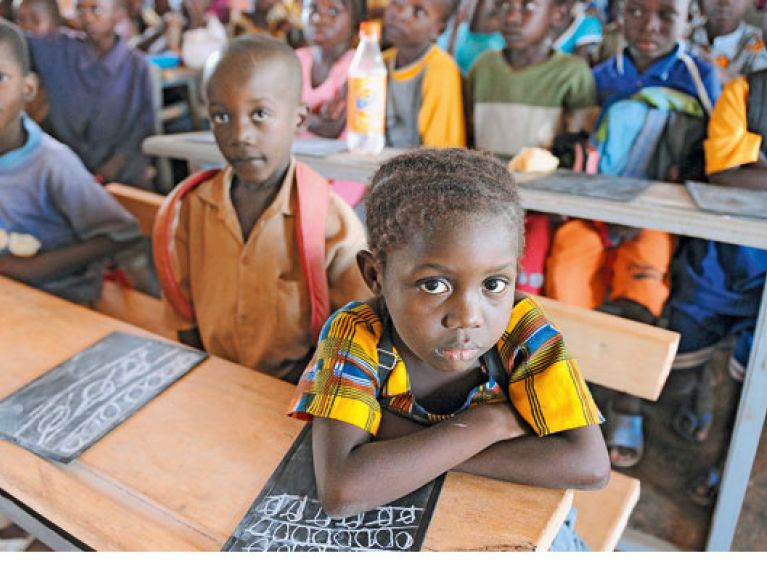Commitment to life in freedom and dignity
Human rights affect almost all areas of politics. The Federal Government is committed to the observance of the rule of law worldwide and equal opportunities for all.

Federal Foreign Minister Frank-Walter Steinmeier says: “Human rights affect almost all areas of politics, in both domestic and foreign policy.” Article 1 of the Basic Law quite deliberately puts human dignity and a commitment to human rights at the very beginning. Human rights are referred to as “the basis of every community, of peace and of justice in the world”. This is also the foundation of Germany’s efforts worldwide with regard to the observance of human rights and basic freedom. To this end, binding agreements are indispensable.
Germany is a party to all important human rights conventions of the United Nations (UN) and the majority of their supplementary protocols. Germany most recently signed the Supplementary Protocol to the Convention against Torture and the Convention on the Rights of Persons with Disabilities, both of which have been in force since 2009. Germany was the first European country to ratify the Supplementary Protocol to the Convention on the Rights of the Child, which enables procedures for individual complaints. An individual complaint gives children and young people worldwide a tool with which to enforce their rights by appealing to the UN Committee for the Rights of the Child. The Federal Government advocates swift ratification of the supplementary protocol by other states. For several years now, Germany has also been committed to ending the abuse of children as soldiers. International care, educational services and therapeutic measures as well as public relations work on children’s rights and political dialogue with conflict parties are all being increased in Germany and internationally in order to ensure that traumatised children can return to a safe everyday life.
Participation in society
The concept of inclusion – in other words the idea that all people can learn, live and work together as well as participate in political, social, and cultural life on equal terms – has been gaining in importance for several years now. The Federal Foreign Office Inclusion Prize was awarded to education projects for the second time in January 2016 to underline the importance of inclusion and participation in schools worldwide. First prize, worth 10,000 euros, went to the European School in Cairo for its Being Different project. In simulated scenarios, students were able to personally experience physical restrictions, impaired vision and poor concentration. Afterwards they were clearly more sympathetic to their fellow students with disabilities.
Improving the human rights situation of women and girls in the world is a major aspect of the Federal Government’s foreign and development policy. In line with the principle “equal rights, equal obligations, equal opportunities and equal power”, Germany adopts a multipronged approach to promote equality. By way of example it employs gender mainstreaming when planning and implementing all development projects, thereby taking into consideration the different life situations of women and girls compared to men and boys. This can mean, for example, specially designed humanitarian assistance packages, or the construction of separate washrooms in refugee camps.
Germany aims to overcome gender-specific discrimination by means of special development measures in partner countries. Be it educational work on women’s rights in Nicaragua or preventive measures for violence against women in Peru and Bolivia, the Federal Government is committed at all levels to the rights of women and girls being observed and guaranteed. The 1979 UN Convention on the Elimination of all Forms of Discrimination against Women provides the framework for this.
Protection of activists
Agreements and treaties are not enough, however, when it comes to enforcing human rights. People are always needed who have the courage, despite the threat of attack and repression, to raise their voice against human rights violations. For this reason the protection of those who stand up in defence of human rights is one of the main spheres of action of German foreign policy. The Federal Chancellor, the Federal Foreign Minister and other high-ranking German representatives frequently meet activists, writers, lawyers and physicians: this kind of attention is one of many ways of affording them protection. At the same time, German foreign policy acts in favour of the abolition of the death penalty and against torture.
Germany seeks to engage worldwide in discussions about fundamental questions pertaining to the rule of law. At government level, for example, it conducts intensive bilateral dialogue on this subject with China and Vietnam. The rule of law is reflected in particular in criminal law and criminal proceedings law. Supporting measures provided by Germany in this field include advice on the drafting of legislation, the restructuring of areas of responsibility between the police, public prosecutors and courts, and the strengthening of institutions with training programmes for public prosecutors, judges and defence lawyers. Between 2002 and 2015 the Federal Government also funded the reform of the laws on criminal procedure in Peru to the tune of some six million euros.
Human rights are not, however, just about protection from attacks and discrimination. In many countries, for example, the human right to water and sanitation is under threat. Worldwide more than 660 million people have no access to clean drinking water and 2.5 billion people have no appropriate sanitation. Every year more children die from the ensuing illnesses than from malaria, measles and HIV/Aids combined. In 2013, Germany and Spain succeeded in convincing the United Nations General Assembly to explicitly recognise the human right to water and sanitation. In 2015, in a new resolution on the topic, the General Assembly established an independent right to sanitation. ▪

